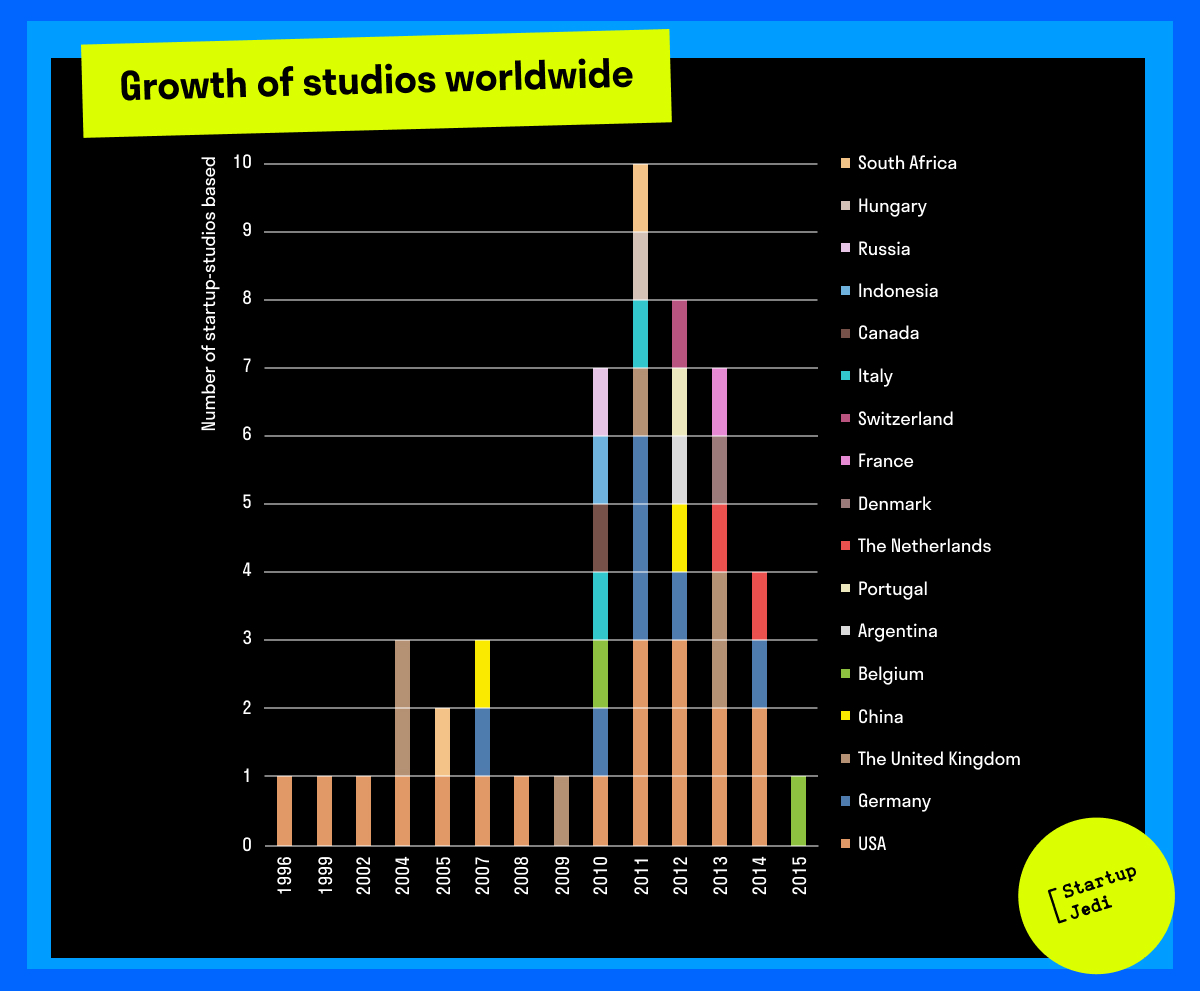
Startup Jedi
We talk to startups and investors, you get the value.

Startup Jedi
We talk to startups and investors, you get the value.
Startup studios are booming worldwide, with their number steadily growing since 2011. The first startup studio — American IdeaLab — appeared much earlier, in 1996. Brothers Bill and Harry Gross took over the creation of a “startup pipeline” virtually at the dawn of the Internet and before the formation of a startup culture. And it worked: over the next few years, studios produced dozens of successful startups, including GoTo.com, which created the world’s first contextual advertising system (sold to Yahoo), the Picasa photo site (bought by Google) and many others. IdeaLab became the first of its kind, well ahead of time. At that time, there was not enough technology for pipeline work with startups: server capacities, digital tools for remote work (and a developed digital world within the Internet), a well-developed algorithm for working with startups through MVP verification.

15 years later, all this has become part of our everyday world, meaning it was time for venture capital construction. Now startup studios in different countries are created every month, and according to a study by the Global Startup Studio Network, their number will triple by 2023.

The most famous and successful startup studios are eFounders, Rocket Internet, Science, Atomic.vc, Pioneer Square Labs. Today, these companies are known all over the world, no less than the leading venture capital funds and accelerators. They produce successful startups on a regular basis, conclude billion-dollar deals, and prove the startup studio idea is viable.
...
Are startup studios just a popular trend that will eventually fade into oblivion, with entrepreneurs returning to the good old “manual” production of startups? Or will startup factories oust the single startups from the market over time?
Probably, startup studios will become a relevant, important and very common form of work with startups. Of course, startups made by the founding team outside the studios will not disappear: after all, companies like Zara have not supplanted handmade clothing, and Coca-Cola peacefully coexists with original lemonades. But, probably, “startup factories” will occupy a large niche in the investment business and become the same familiar and tried-and-true tool as accelerators and venture funds. There are several reasons why the trend at a startup studio will not disappear and will only intensify — let’s take a closer look at them.

The transition from “manual production” to a system in which all components are maximally automated is a natural process in any human activity. We are not only talking about the transition from manual assembly of cars to the Henry Ford assembly line and the entire subsequent development of the technological sphere, this process is more global. We can observe it in the development of any organization, and startups are no exception. At first, a small group of people does everything manually and moves rather chaotically, then, as the company grows, there’s more and more automation — some processes are outsourced to specialists, many decisions are no longer made by founders. If a startup grows to its limit — a company of international scale — there is practically nothing left of that small project that was created manually: the company’s growth is governed by numerous sets of rules, regulations and automated systems.
A similar process is happening with the entire startup industry. Much has changed since the days of Microsoft, Google, Apple, which were created in the garages and kitchens of the founders. There appeared “protocols” regulating work with startups, a lot of organizations doing the same work that the founders used to do (for example, intermediaries in finding investors). Creating a “startup pipeline” is the next round of development in the startup industry.

More and more companies are not only increasing the number of sales, but are also creating parallel services and products that interact with each other. As a side effect of this trend, you can now hear the words “ecosystem” and “business synergy” in every second Instagram account. But no matter how “blurred” these terms are, they define the essence correctly: the business is moving from “develop or die” to “create your own ecosystem for users or die” strategy. In the CIS market, tech giants like Yandex and Sber are buying up companies in different niches, expanding their influence in the market and involving an increasing segment of the audience in their system. Another undoubted plus of ecosystems is saving resources.
Both of these advantages are implemented in start-up studios perfectly. Many businesses are created here that can interact and solve each other’s problems. A centralized approach to startups — a single back office, a pool of investors, a sales department — speeds up and simplifies the growth of each individual startup.

The Internet has become the main catalyst for the spread of outsourcing: now it is much easier and cheaper not to do it yourself, and to find a professional — there are always enough offers on the world market. This is why startup studios are a welcome partner for large tech corporations that need to create new products and projects.
For a long time, Google and other giants tried to create new startups and technologies on their own. It did not quite work out: according to a recent study, up to 90% of startups acquired by corporations turn out to be unprofitable. This “curse of big corporations” has spawned a lot of speculation about the need for a “spirit of freedom” and some kind of secret ingredient that only appears in the kitchen or in the garage of the founder to create startups. But, in fact, everything is simpler: the vector of movement of a large corporation rarely coincides with a small company. This is not a favourable environment for the development of a startup. Therefore, it is easier and cheaper for companies to cooperate with studios, ordering startups, for example, in the niche where a technological solution is needed, but it is not yet available.
By the way, many studios are already focused on working with corporations. The Mexican startup studio InnoHub was jointly founded by three corporations from different fields (finance, logistics and communications). Now the studio creates products and technological solutions for them.

The popularity of such professions as project and product manager is no coincidence: there is less and less process work, and more and more project work. Any large company needs a certain product to meet its needs, which has to be developed and tested independently, and a successful solution can become an additional source of income for the company. In the future, companies will need more and more products — and start-up studios will have more and more potential customers. Perhaps, over time, ordering a startup that solves a particular request at a startup factory will be as commonplace as ordering marketing services or an advertising campaign at an agency.

More and more technological products are created every year, and each of them needs its own ecosystem of solutions. Instagram appears and takes off — and for it, we need applications for SMM specialists, mechanisms that analyse statistics, phones focused on using Instagram, cameras and lenses … Every year, hundreds of such products are created on the b2b market and thousands — on the b2c market. And technologies are becoming obsolete more and more rapidly, they are being replaced by new ones.
A reliable fast “machine” of venture studios is something that will help quickly close constantly emerging new solutions and develop not just one startup, but dozens of products that cover all the needs in a particular niche.
...

Working in the studio removes almost all the risks of a startup failure. However, the idea itself can change beyond recognition. Considering how many startup studios are on the market right now, it will not be difficult to find the most suitable conditions. Yes, ambitions say that you have to do everything yourself, but a more rational approach is also possible: do not spend several years on one product that may not “take off”, but quickly complete a project, gain experience and financial independence and move on to the next one.

Startup studios are working on and testing a huge number of ideas, so if you work in a promising and potentially profitable niche, you need to understand that your idea is almost certainly now at work with a venture studio where the team has a big head start. They have infrastructure, a back office, and well-established relations with investors. This must be taken into account when analysing risks and considering your competitive advantages.

Another trend is serial entrepreneurship. Once you’ve created a successful product, you don’t have to jump into the CEO chair and dive into 24/7 meetings — you can keep building. Using the framework of a startup studio, you can assemble a team and scale your activity: create not one startup in a few years, as a single entrepreneur, but dozens.

Any large-scale phenomenon generates a lot of speculation, and startup studios are no exception. The further, the more scammers will appear who, behind loud words and aggressive PR, will simply lure money and shares from the founders. Fortunately, you can always recognize a real studio by reading its startup stories and working conditions.

Any entrepreneur already has a unique chance to start their entrepreneurial journey by working in a startup studio team. Over the course of a year, you will check and launch not one, but dozens of ideas, become an expert in your niche, learn by heart the entire branching algorithm for creating a startup, and you will definitely be much more ready to conquer the world than after going through the entire thorny path of a product creator on your own.
What’s next for startup studios? Time will tell: after all, according to creativity expert Michael Mikalko, we are all moving into the future at a speed of 60 minutes per hour. We set out our hypothesis and arguments — what do you think?

Facebook: facebook.com/StartupJedi/
Telegram: t.me/Startup_Jedi
Twitter: twitter.com/startup_jedi
Comments